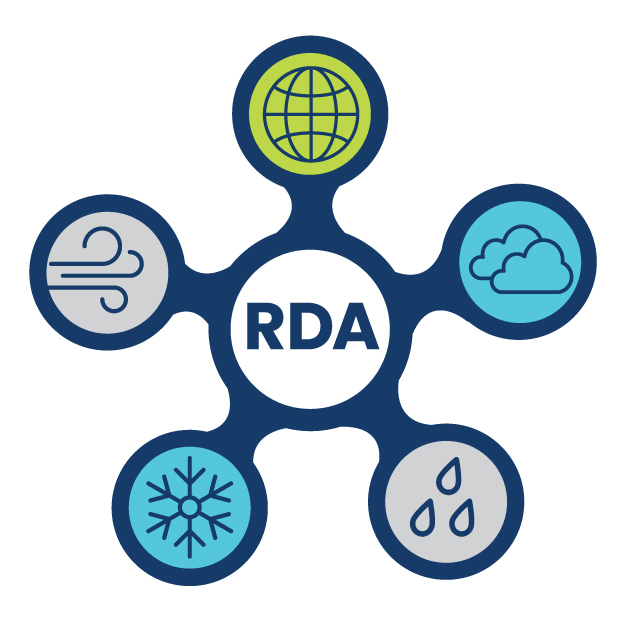
JRA-55: Japanese 55-year Reanalysis, Daily 3-Hourly and 6-Hourly Data
d628000
| DOI: 10.5065/D6HH6H41
Important Notice: Update of JRA-55 data will terminate at the end of January 2024. Please use Japanese Reanalysis for Three Quarters of a Century (JRA-3Q) at that time.
The Japan Meteorological Agency (JMA) conducted JRA-55, the second Japanese global atmospheric reanalysis project. It covers 55 years, extending back to 1958, coinciding with the establishment of the global radiosonde observing system. Compared to its predecessor, JRA-25, JRA-55 is based on a new data assimilation and prediction system (DA) that improves many deficiencies found in the first Japanese reanalysis. These improvements have come about by implementing higher spatial resolution (TL319L60), a new radiation scheme, four-dimensional variational data assimilation (4D-Var) with Variational Bias Correction (VarBC) for satellite radiances, and introduction of greenhouse gases with time varying concentrations. The entire JRA-55 production was completed in 2013, and thereafter will be continued on a real time basis.
Specific early results of quality assessment of JRA-55 indicate that a large temperature bias in the lower stratosphere has been significantly reduced compared to JRA-25 through a combination of the new radiation scheme and application of VarBC (which also reduces unrealistic temperature variations). In addition, a dry land surface anomaly in the Amazon basin has been mitigated, and overall forecast scores are much improved over JRA-25.
Most of the observational data employed in JRA-55 are those used in JRA-25. Additionally, newly reprocessed METEOSAT and GMS data were supplied by EUMETSAT and MSC/JMA respectively. Snow depth data over the United States, Russia and Mongolia were supplied by UCAR, RIHMI and IMH respectively.
The Data Support Section (DSS) at NCAR has processed the 1.25 degree version of JRA-55 with the RDA (Research Data Archive) archiving and metadata system. The model resolution data has also been acquired, archived and processed as well, including transformation of the TL319L60 grid to a regular latitude-longitude Gaussian grid (320 latitudes by 640 longitudes, nominally 0.5625 degree). All RDA JRA-55 data is available for internet download, including complete subsetting and data format conversion services.
When accessing the JRA data, you agree to the following Terms and Conditions:
a. Conditions of use
- Individual users must register their name, affiliation and email address with NCAR before access to datasets will be permitted.
- The source of the datasets should be duly acknowledged in scientific and technical papers, publications, press releases and other communications regarding the datasets. Example: The dataset used for this study is from the Japanese 55-year Reanalysis (JRA-55) project carried out by the Japan Meteorological Agency (JMA).
- Individual users should provide JMA (jra@met.kishou.go.jp) with a copy of their scientific or technical papers, publications, press releases or other communications regarding these datasets.
b. Disclaimer
- Although JMA has taken the utmost care in creating the datasets, it assumes no responsibility regarding their reliability. JMA is not responsible for any damage that may result from their use.
c. Intellectual property
- The intellectual property rights of the datasets belong exclusively to JMA.
(The complete JMA and NCAR agreement for JRA-55 may be viewed via the Documentation tab.)
| Air Temperature | Atmospheric Heating | Atmospheric Stability | Brightness Temperature |
| Canopy Characteristics | Cloud Frequency | Cloud Liquid Water/Ice | Convergence |
| Dew Point Temperature | Evaporation | Evapotranspiration | Geopotential Height |
| Gravity Wave | Heat Flux | Heat Flux | Humidity |
| Hydrostatic Pressure | Ice Extent | Land Surface Temperature | Land Use/Land Cover Classification |
| Longwave Radiation | Maximum/Minimum Temperature | Potential Temperature | Precipitation Amount |
| Precipitation Rate | Runoff | Sea Level Pressure | Shortwave Radiation |
| Snow Depth | Snow Water Equivalent | Soil Moisture/Water Content | Soil Temperature |
| Streamfunctions | Surface Pressure | Surface Roughness | Surface Winds |
| Total Precipitable Water | Tropospheric Ozone | Upper Air Temperature | Upper Level Winds |
| Vegetation Species | Vertical Wind Velocity/Speed | Vorticity | Water Vapor |
Latitude Range: Southernmost=90S Northernmost=90N Detailed coverage information Detailed coverage information 0.562° x ~0.562° from 0E to 359.438E and 89.57N to 89.57S (640 x 320 Longitude/Gaussian Latitude) 0.563° x ~0.562° from 0E to 359.438E and 89.57N to 89.57S (640 x 320 Longitude/Gaussian Latitude) 1.25° x 1.25° from 0E to 1.25W and 90N to 90S (288 x 145 Longitude/Latitude) 1.25° x 1.25° from 0E to 358.75E and 90N to 90S (288 x 145 Longitude/Latitude) 2.5° x 2.5° from 0E to 2.5W and 90N to 90S (144 x 73 Longitude/Latitude) 2.5° x 2.5° from 0E to 357.5E and 90N to 90S (144 x 73 Longitude/Latitude)
 This work is licensed under a Creative Commons Attribution 4.0 International License.
This work is licensed under a Creative Commons Attribution 4.0 International License.